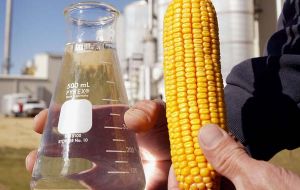MercoPress. South Atlantic News Agency
Growing controversy in US over corn ethanol vs food prices
 There is no conflict between food and fuel “we can produce both,” said McCauley, Pte. of the National Corn Growers
There is no conflict between food and fuel “we can produce both,” said McCauley, Pte. of the National Corn Growers The main ethanol lobby in United States, Renewable Fuels Association, RFA, said that the growing demand for renewable fuel based on corn is not responsible for the recent increase in milk and dairy products worldwide.
"Ethanol critics and many in the media charge that the rising price of corn due to growing ethanol demand is the major culprit for moderately rising consumer food prices. Conspicuously absent from the discussion is the chief reason for increasing food costs: escalating energy costs", said Matt Harwig from RFA. However, according to a new analysis of food, energy and corn prices conducted by John Urbanchuk of LECG, LLC, "rising energy prices had a more significant impact on food prices than did corn." In fact, rising energy prices have twice the impact on the Consumer Price Index (CPI) for food than does the price of corn, according to the report. "Energy costs have a much greater impact on consumer food costs as they impact every single food product on the shelf," said Urbanchuk. "Energy is required to produce, process, package and ship each food item. Conversely, corn prices impact just a small segment of the food market as not all products rely on corn for production. While it may be more sensational to lay the blame for rising food costs on corn prices, the facts don't support that conclusion. By a factor of two-to-one, energy prices are the chief factor determining what American families pay at the grocery store." According to the study, "Increasing petroleum prices have about twice the impact on consumer food prices as equivalent increases in corn prices. A 33 percent increase in crude oil prices" the equivalent of $1.00 per gallon over current levels of retail gasoline prices "would increase retail food prices measured by the CPI for food by 0.6 to 0.9 percent. An equivalent increase in corn prices "about $1.00 per bushel over current levels would increase consumer food prices only 0.3 percent." The report goes on to find, "Corn and energy prices both affect consumer food prices. However, since increases in corn prices are limited to a relatively small portion of the overall CPI for food, an increase in corn prices resulting from higher ethanol demand or a supply disruption such as a major drought is expected to have about half the impact of the same percentage increase in petroleum and energy prices." "Critics of ethanol, including those in the animal feeding and oil industries, are engaging in baseless scare tactics to convince people that ethanol production will irreversibly increase their grocery bills," said Renewable Fuels Association President Bob Dinneen. "While it is true increased ethanol production is creating a real market-driven price for corn, this report clearly presents the undeniable facts: energy prices, not ethanol, are responsible for much of the increase in the price of food. Further, our industry is rapidly developing next generation cellulosic ethanol technology that will allow us to meet the growing demand for renewable fuels from wood chips, switch grass and other materials in addition to corn. Ultimately, the market will adjust and all those in the food, fuel and fiber industry will be able to prosper." Much of the debate has been centered on the notion that the U.S. will not be able to produce enough corn to satisfy all markets, creating shortages and intensifying competition that will continuously drive the price of corn higher. This claim misses some key facts. Advancements in seed, farming and ethanol technologies are allowing American farmers to continue feeding the world while helping to fuel our nation. There is no conflict between food and fuel "we can produce both," said Ken McCauley, president of the National Corn Growers Association. "Demand for corn is at unprecedented levels, and we fully expect unprecedented levels of supply as well. This spring U.S. corn growers planted the largest crop this country has seen since the 1940s. Given normal weather conditions this summer, we'll produce the largest corn crop in history, and that will allow us to readily satisfy demand for livestock feed, human food processing, exports and fuel ethanol".




Top Comments
Disclaimer & comment rulesCommenting for this story is now closed.
If you have a Facebook account, become a fan and comment on our Facebook Page!